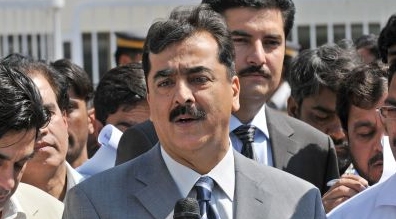
By Majed Iqbal- Tuesday 25th march 2008 saw Syed Yousaf Raza Gillani sworn in as Pakistan's new Prime Minister in the central hall of the Aiwan-e-Sadr by President Pervez Musharraf, making him the country's 25th Prime Minister.
After a turbulent tenure of Musharraf's nearly 9 year rule, the Pakistani nation looked ahead for a new change and a more promising future amidst the sequence of events which had bought the country to standstill over the last couple of months.
Gillani's Political background and family history seemed to have appeased segments of the nation who saw some depth in him. His father Alamdar Hussain Gillani was a signatory to the Pakistan Resolution, the 1940 document that laid the ground for the creation of Pakistan. His grandfather Ghulam Mustafa Shah Gillani and paternal uncle Raza Shah Gillani were both MLAs in the 1940s whilst his great-grandfather Raja Bakhsh Gillani was Mayor of Multan in 1921.
With a rich family History who played a role in the formation of the Pakistani State in its inception, loyalty to the nation and the masses first, which Musharraf failed miserably to deliver through his blind subservience on the "war on Terror" was something which all were expecting to envisage in the New prime Minister.
However, visits made by the US Assistant Secretary of State, Richard Boucher, and the US Deputy Secretary of State, John Negroponte straight after the elections drew immediate scepticism and gave reminiscent vibes of the actions of the previous government which steered heavily on foreign agendas.
In fact, the very first words of the very first speech of the new Prime Minister, after he obtained a vote of confidence were a commitment to America's war on Terror. He said, "Our first priority is the War on Terror. This War on Terror is our war." On 1 April the new Foreign Minister, Shah Mehmood Qureshi, declared at a press briefing outside Zardari House, "The War on Terror is not America's issue, but ours."
Surprisingly, even at a time when global support for America's War on Terror was showing diminished support internationally, the new government announced its full support for this war which Pakistan had paid a heavy price for through the sacrifice of hundreds of Pakistan's soldiers to protect America's occupation, operations by American intelligence agencies including its FBI and the provision of oil for the NATO forces in Afghanistan through Pakistan.
Zaffar Abbas, an editor with Pakistani newspaper Dawn, said the arrival of the US delegation on the day the new prime minister had been sworn in suggested they were "trying to dictate terms".
"The problem with the Americans is they don't understand the domestic pressure on the new government," Mr Abbas told the Associated Press news agency.
"People are expecting this government to explore other possibilities for a solution to what's happening in the tribal areas," he said.
The last year saw endlessly rising prices for basic commodities like flour, water and electricity spiralling out of control which spawned out of ill-designed policies from the Musharraf's government who had embraced World Bank and IMF policies whole-heartedly, leading the economy to devastation.
However, the new government has also embraced the same international financial institutions with senior officials of the World Bank who began their meetings with the new finance minister and even the expected future Chief Minister of Pakistan's largest province, Punjab, Shahbaz Shareef with policies to privatize the important public assets and utilities.
The new Federal Minister for Privatisation and Investment tried to dress-up the ugly face of privatization by declaring on 1 April 2008, "Privatisation of government assets, in a professional and constructive manner, will continue,"
This is all steam-rolling ahead despite the people of Pakistan being crippled by price rises in fuel and utilities and a failure of these very institutions who have a track record of destroying economies in Africa, Asia and Latin America through their Structural Adjustment Programmes and neo-colonialist agendas of maintaining economic slavery to the West.
In fact, the new Prime Minister seemed so enthusiastic in pursuing an identical agenda to his predecessor in tackling the growing support for Islam in the country when he stated in his briefing with the Chief of Army Staff on 2nd April that"Policies will be made for the end of terrorism and extremism... and if the need be the army will be used."
Despite displaying zeal and passion to undo the misdeeds to slash the U.S.-backed president's sweeping powers of Musharraf and vowing to review his counterterrorism policies, Gillani has in fact rolled out policies no different to what Musharraf offered.
In fact Gillani has been more open with ties to America in his inception than Musharraf was in 1999 when he came into power via a bloodless coup through American orders, which was all kept hush until the true colours began to display after 9/11.
Surely one would have expected Gillani to be a more thoughtful Leader and Politician especially after authoring a book, "Chahe Yusuf Se Sada" written while in jail where he shares his experience and first hand accounts of Pakistan's political leaders and their contribution to the political system starting from Zia Ul Haq and ending with the current Musharraf regime.
Only time will tell if the New Prime minister will need to find additional pages to add to his book of his own legacy in the portfolio of leaders who lacked any real principles to lead the nation of Pakistan and instead opted for outsourced politics from foreign nations whose designs on various parts of the world, like Iraq and Afghanistan have reaped utter devastation in their quests for material desire and political dominance.
No comments:
Post a Comment